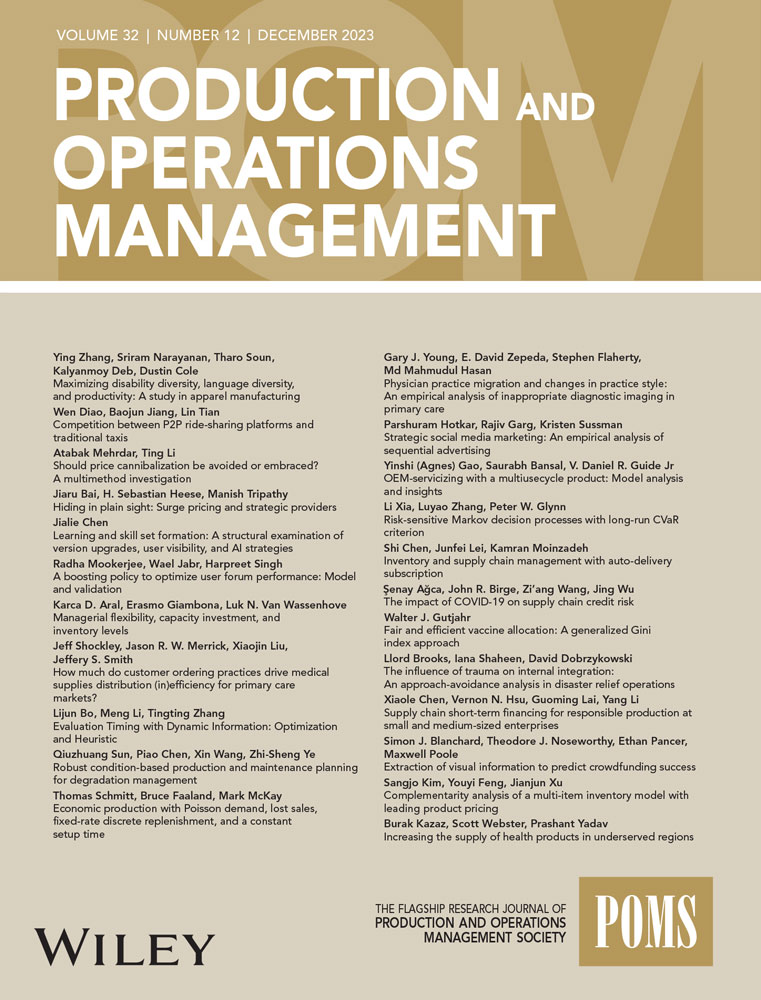Coordinated charging station search in stochastic environments: A multiagent approach
IF 5.1
3区 管理学
Q1 ENGINEERING, MANUFACTURING
引用次数: 0
Abstract
Abstract Range and charge anxiety remain essential barriers to a faster electric vehicle (EV) market diffusion. To this end, quickly and reliably finding suitable charging stations may foster an EV uptake by mitigating drivers' anxieties. Here, existing commercial services help drivers to find available stations based on real‐time availability data but struggle with data inaccuracy, for example, due to conventional vehicles blocking the access to public charging stations. In this context, recent works have studied stochastic search methods to account for availability uncertainty in order to minimize a driver's detour until reaching an available charging station. So far, both practical and theoretical approaches ignore driver coordination enabled by charging requests centralization or sharing of data, for example, sharing observations of charging stations' availability or visit intentions between drivers. Against this background, we study coordinated stochastic search algorithms, which help to reduce station visit conflicts and improve the drivers' charging experience. We model a multiagent stochastic charging station search problem as a finite‐horizon Markov decision process and introduce an online solution framework applicable to static and dynamic policies. In contrast to static policies, dynamic policies account for information updates during policy planning and execution. We present a hierarchical implementation of a single‐agent heuristic for decentralized decision making and a rollout algorithm for centralized decision making. Extensive numerical studies show that compared to an uncoordinated setting, a decentralized setting with visit intentions sharing decreases the system cost by 26%, which is nearly as good as the 28% cost decrease achieved in a centralized setting. Even in long planning horizons, our algorithm reduces the system cost by 25% while increasing each driver's search reliability.随机环境下的协同充电站搜索:一种多智能体方法
续航里程和充电焦虑仍然是阻碍电动汽车市场快速发展的重要因素。为此,快速可靠地找到合适的充电站可能会通过减轻司机的焦虑来促进电动汽车的普及。在这里,现有的商业服务可以帮助司机根据实时可用性数据找到可用的充电站,但由于数据不准确,例如,由于传统车辆阻塞了通往公共充电站的通道。在这种情况下,最近的研究工作研究了随机搜索方法,以解释可用性的不确定性,以便最大限度地减少司机的绕路,直到到达可用的充电站。到目前为止,实践和理论方法都忽略了充电请求集中或数据共享所带来的驾驶员协调,例如,在驾驶员之间共享充电站可用性或访问意图的观察结果。在此背景下,我们研究了协调随机搜索算法,该算法有助于减少站点访问冲突,改善驾驶员的充电体验。本文将一个多智能体随机充电站搜索问题建模为一个有限视界马尔可夫决策过程,并引入了一个适用于静态和动态策略的在线求解框架。与静态策略相比,动态策略负责策略规划和执行期间的信息更新。我们提出了用于分散决策的单代理启发式的分层实现和用于集中决策的rollout算法。大量的数值研究表明,与不协调的设置相比,访问意图共享的分散设置降低了26%的系统成本,这与集中式设置降低28%的成本几乎相同。即使在较长的规划范围内,我们的算法在提高每个驾驶员的搜索可靠性的同时,也将系统成本降低了25%。
本文章由计算机程序翻译,如有差异,请以英文原文为准。
求助全文
约1分钟内获得全文
求助全文
来源期刊

Production and Operations Management
管理科学-工程:制造
CiteScore
7.50
自引率
16.00%
发文量
278
审稿时长
24 months
期刊介绍:
The mission of Production and Operations Management is to serve as the flagship research journal in operations management in manufacturing and services. The journal publishes scientific research into the problems, interest, and concerns of managers who manage product and process design, operations, and supply chains. It covers all topics in product and process design, operations, and supply chain management and welcomes papers using any research paradigm.
 求助内容:
求助内容: 应助结果提醒方式:
应助结果提醒方式:


